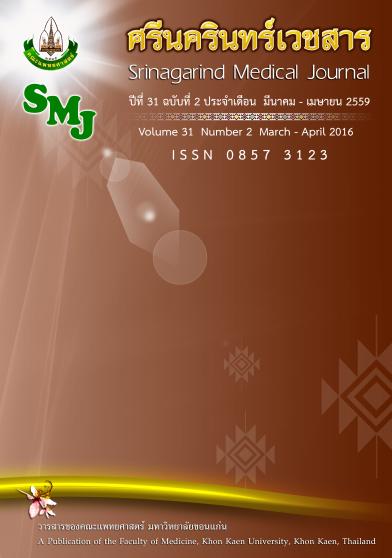Antimicrobial and Antiadhesive Activities of the Crude Biosurfactant From Bacillus Sp. Against Clinical Isolates of Acinetobacter Baumannii from Srinagarind Hospital
Keywords:
Biosurfactant, Bacillus sp., Acinetobacter baumanniiAbstract
Background and Objectives: Acinetobacter baumannii is a cause of hospital-acquired infection. It can form biofilm on medical devices which is related to antibiotic resistance and the chronic infections. Biosurfactants (BS) were produced from microorganisms that have antibacterial, antifungal, and antiviral activities. Previous study showed BS from Bacillus sp. prevent biofilm formation of pathogens in human. The aims of this study were to determine the activities of crude BS from Bacillus sp. to inhibit the growth and adhesion of clinical A. baumannii isolates from Srinagarind hospital.
Methods: Two samples of crude BS were extracted from 2 isolates of B. amyloliquefaciens KKU3 and KKU14. Crude biosurfactants were determined antimicrobial activity on 96-well plate and antiadhesive activity on intravenous (IV) tube.
Results: Crude BS sample from B. amyloliquefaciens KKU14 strain can inhibit the growth of five clinical isolates A. baumannii which were inhibited in range of 2-3%, 32-33%, 35-37%, 78-82% and 81-84% at 50, 80, 100, 150 and 200 mg/ml respectively, and inhibited adhesion of A. baumannii on IV tube when compare with untreated IV tube.
Conclusions: BS may be used as a new clean up agent for washing the medical-equipments in laboratory or a coating agent on medical devices to prevent the contamination of pathogens in hospital and may use as an alternative therapeutic agent for local infection in the future.




